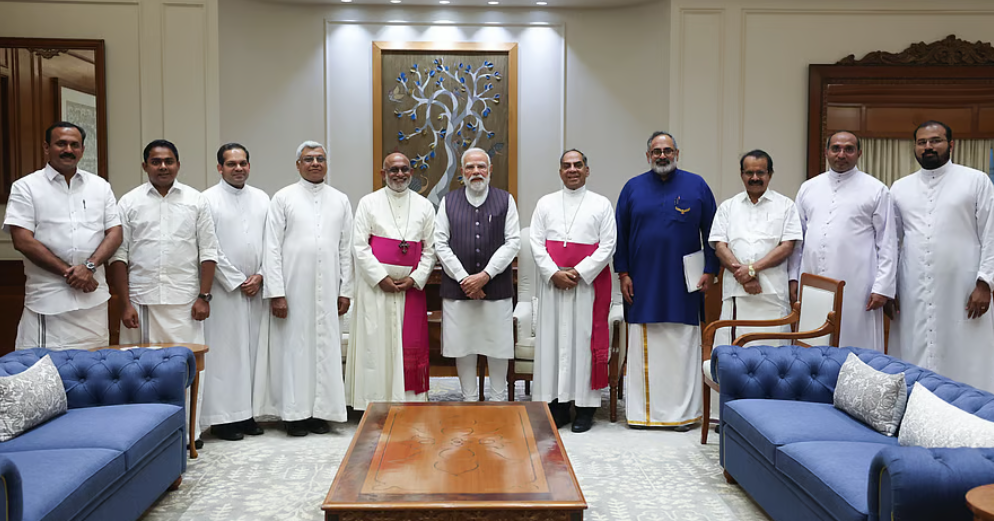While Modi reassures Kerala bishops, new false reports emerge in Madhya Pradesh
The prime minister met with a delegation from the Syro-Malabar Church in Delhi a few days after the controversy over anti-conversion billboards in Chhattisgarh. BJP representative: ‘We are ready to help anyone, not everything should be viewed through a religious lens.’ Meanwhile, in another state governed by Hindu nationalists, young people studying at the seminary in the diocese of Gwalior are being targeted.
Kochi (AsiaNews) - Bishops of the Syro-Malabar Church in Kerala met yesterday in Delhi with Indian Prime Minister Narendra Modi, who is also the leader of the BJP, the Hindu nationalist party.
The face-to-face meeting took place at the same time as the Syro-Malabar Church strongly criticised the posting in some villages in Chhattisgarh of signs prohibiting entry to pastors and Christian converts, and while new specious accusations of conversion of tribal students were being made against the diocese of Gwalior in Madhya Pradesh. Two states governed by Hindu nationalists
At the meeting in Delhi, Prime Minister Modi reassured the bishops by offering every possible help and support from the central government. The president of the BJP in Kerala, Rajeev Chandrasekhar, who was present at the meeting, reported that the prime minister told the delegation, led by the head of the Syro-Malabar Church, Major Archbishop Raphael Thattil: ‘I am always at your service.’
Chandrasekhar told reporters in Delhi that it was a courtesy visit during which the issue of minority rights was discussed ‘in general’. He added that his party and the central government are ready to work for anyone who asks for help and that not everything should be seen ‘through a political lens’.
‘We work for everyone, we don't look at everything through a religious lens. Not everything is politics,’ Chandrasekhar said. When journalists asked him why it is precisely the states governed by the BJP that see the most attacks against Christians and other minorities, he replied that it is “wrong” to make such ‘generalisations’ and that there are laws and courts to enforce them.
The local leader of the Hindu nationalists also claimed that during the discussion with the Syro-Malabar Church delegation, there was no mention of a possible invitation to Pope Leo to visit India or of the attacks on nuns in Chhattisgarh.
In stark contrast to this reassuring picture is what happened at the same time in the diocese of Gwalior, in the state of Madhya Pradesh. Local reports fuelled by the usual campaign launched by groups linked to Hindutva pointed the finger at ‘children who were allegedly being taught religious practices’ at a diocesan house in Badagaon, about 8 km from the city, to ‘become future religious leaders’.
The authorities argued that such activities, if carried out without prior notification, could fall under the category of ‘forced religious conversion’ according to state regulations. The diocese had to reject these accusations as ‘unfounded and without any basis’, created by groups that ‘harbour prejudices against the Church’.
Clarifying the situation, the spokesperson explained that the students are Catholic seminarians studying at St Joseph's Seminary, sent by their families for educational reasons. ‘All the necessary documentation is in order, including affidavits from the parents confirming that they have sent their children to study.’
07/02/2019 17:28
16/05/2024 13:04
28/08/2021 10:32







.png)










